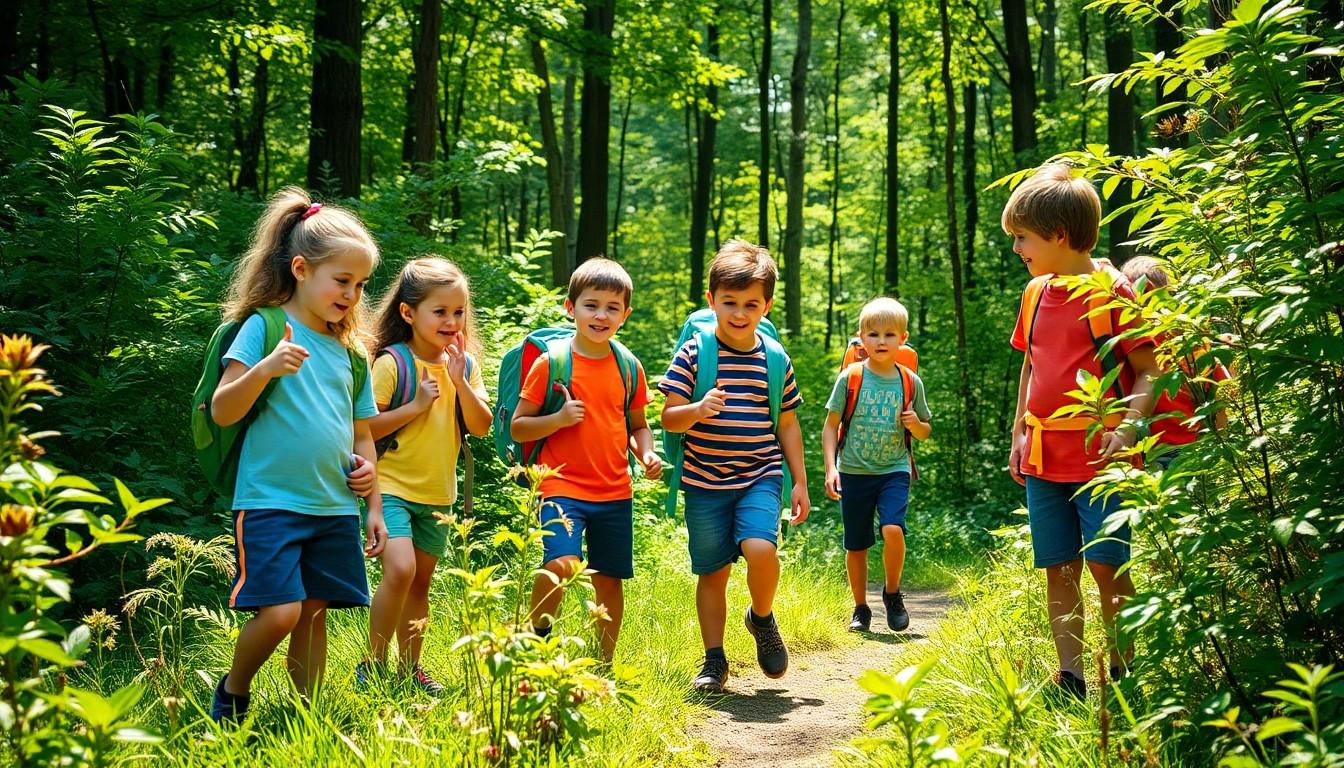Physical Address
304 North Cardinal St.
Dorchester Center, MA 02124

Imagine a classroom where the walls are made of trees and the ceiling is a bright blue sky. Outdoor learning activities transform traditional education into an adventure, blending fresh air with fresh ideas. Students don’t just learn about nature; they dive into it, discovering the wonders of the world around them.
Outdoor learning activities encompass a variety of experiences aimed at enriching traditional education. These activities allow students to immerse themselves in nature, fostering curiosity and hands-on learning. Examples include nature walks, where students observe flora and fauna, or rock climbing sessions that build teamwork and physical skills.
Engaging in outdoor experiments amplifies understanding of scientific concepts. Students might conduct water testing in local streams to learn about ecosystems. Opportunities for outdoor art projects inspire creativity, allowing students to create works using natural materials.
Field trips to natural reserves offer further exploration of biodiversity. Students often engage in activities like bird watching, which sharpens observational skills. Additionally, camping trips can teach survival skills while promoting teamwork and resilience.
Outdoor learning employs inquiry-based learning, encouraging students to ask questions about their surroundings. Different age groups benefit from tailored activities that suit their developmental stages. For instance, younger students might find treasure hunts engaging, while older ones could embark on ecological surveys.
Integration with technology enhances experience. Apps for identifying plants or tracking wildlife provide interactive elements. Collaboration with local organizations strengthens community ties and enriches educational experiences.
These activities improve physical health, well-being, and social connections. By fostering an appreciation for the environment, outdoor learning plays a crucial role in nurturing responsible and engaged citizens.

Outdoor learning activities offer numerous benefits for students, enhancing both cognitive and social skills.
Outdoor activities stimulate cognitive growth. Engaging with nature fosters critical thinking and problem-solving abilities. Nature walks promote observation skills, allowing students to notice details they might otherwise overlook. Experiments in natural settings encourage students to apply theoretical knowledge to real-world situations. Using technology during outdoor adventures supports learning, integrating digital tools with hands-on experiences. Those experiences lead to improved retention of information. With diverse settings, students learn adaptability and creativity. Exposure to various stimuli in an outdoor environment enhances memory and focus.
Outdoor learning activities cultivate social skills. Collaborative projects, such as group hikes or nature-based art installations, encourage teamwork and communication. Students learn to respect differing opinions and negotiate tasks effectively. Through shared experiences, they form stronger bonds with peers, fostering friendship. Taking part in outdoor games emphasizes friendly competition, helping students build confidence and resilience. Exposure to diverse environments encourages empathy for nature and peers. Group reflections after activities promote critical discussions, enhancing group dynamics. These interactions lay the groundwork for future cooperative efforts in various contexts.
Outdoor learning activities encompass various engaging experiences that connect students with nature. These activities can positively influence educational outcomes, cater to diverse interests, and promote personal growth.
Nature walks and hikes provide immersive opportunities for exploration. Students observe plants, animals, and geological formations, enhancing their understanding of ecosystems. During these activities, inquiries about local flora and fauna can deepen knowledge about biodiversity. Identification of plants and wildlife fosters critical thinking skills. Observational skills improve as students take notes or sketch their surroundings. Engaging with nature reinforces the importance of environmental stewardship.
Educational games often enhance outdoor learning experiences while combining fun with educational value. Tag-based games can teach physical skills and teamwork, while scavenger hunts encourage critical thinking and problem-solving. Nature-themed trivia can serve to increase environmental awareness. Students gain practical knowledge in various subjects through interactive challenges. Games that incorporate technology, like GPS devices for orienteering, add a modern twist. Cooperative activities build cooperation, communication, and engagement among peers.
Gardening and environmental projects actively engage students with hands-on experiences. Cultivating plants teaches responsibility and patience while reinforcing science concepts. Projects like composting illustrate the importance of sustainability and recycling. Each step in gardening fosters a connection to food sources and ecosystems. Collaborating on community gardens enhances social interaction and teamwork. Environmental restoration projects empower students to actively contribute to local ecosystems, inspiring environmental stewardship and awareness.
Effective implementation of outdoor learning activities requires careful planning and preparation. Identify goals for each activity to ensure alignment with educational standards. Gathering necessary resources enhances the experience. Teachers can stock materials like maps, field guides, and safety gear for various activities. Scheduling outings in advance allows for proper logistics and weather considerations. Reflecting on past activities helps in refining future lessons.
Begin by selecting appropriate locations that inspire exploration. Consider accessibility for all students while ensuring safety. Create a detailed itinerary that outlines activities, times, and locations. Integrating curriculum objectives into outdoor activities maximizes learning opportunities. Communicate with colleagues for collaborative efforts, such as joint field trips. Securing necessary permissions from parents and school administrators fosters support. Preparing students with pre-activity lessons reinforces expectations and enhances engagement.
Prioritize safety by conducting thorough risk assessments before outdoor activities. Ensure all participants receive clear instructions regarding the environment. Establish a first aid kit for emergency situations, stocked with essential supplies. Examine weather forecasts to avoid hazardous conditions. Group students into smaller teams to promote close supervision. Designate a first aid officer within each group to handle any incidents efficiently. Remind students about the importance of staying within designated boundaries.
Outdoor learning activities offer invaluable experiences that extend beyond traditional classroom walls. By engaging with nature students not only enhance their academic skills but also develop a deeper connection to the environment. These activities foster critical thinking teamwork and empathy while promoting physical health and social interaction.
Effective planning and safety measures are crucial for maximizing the benefits of outdoor learning. When educators thoughtfully implement these experiences they create a dynamic learning environment that inspires curiosity and responsibility. Ultimately outdoor learning cultivates well-rounded individuals who appreciate the world around them and are prepared to engage as responsible citizens.